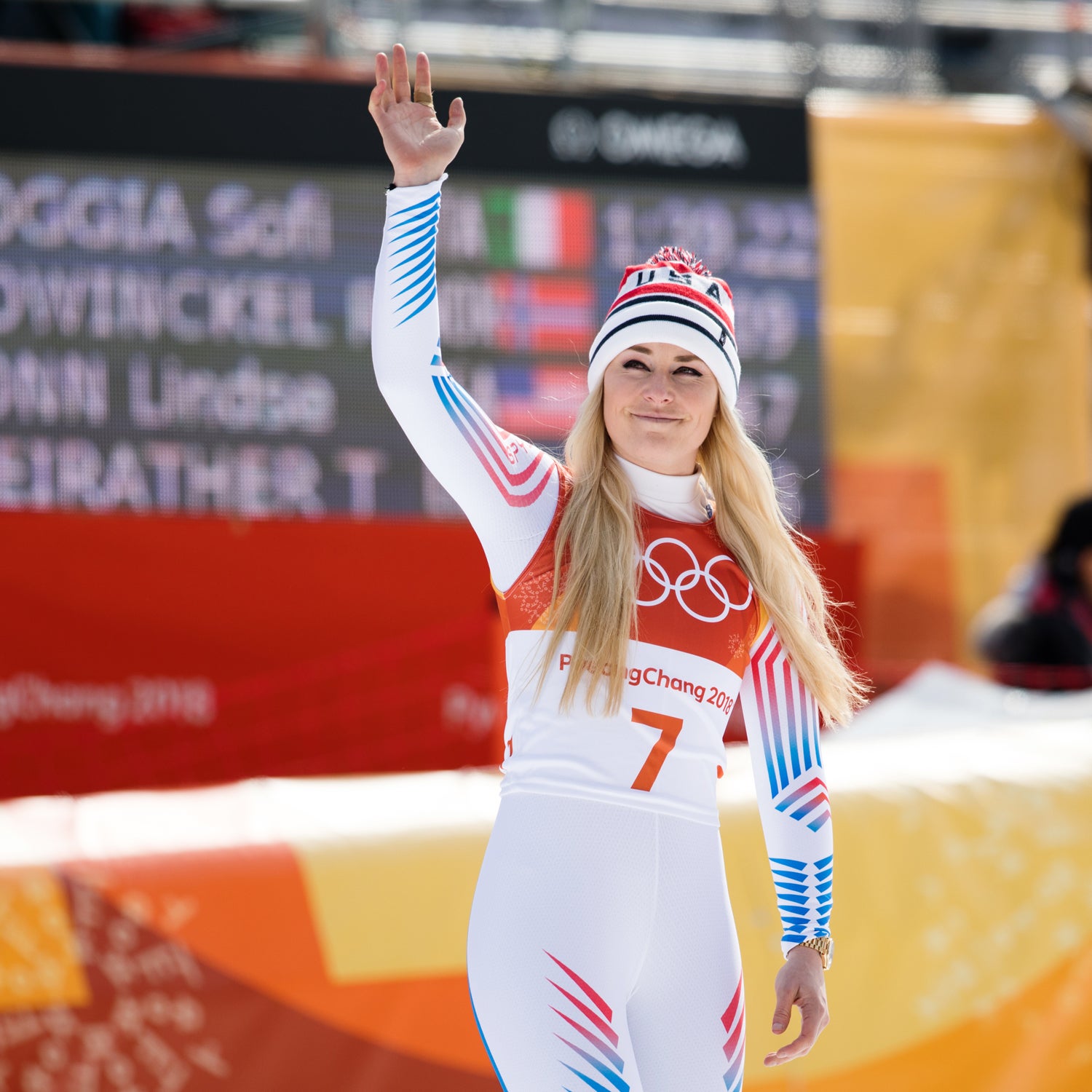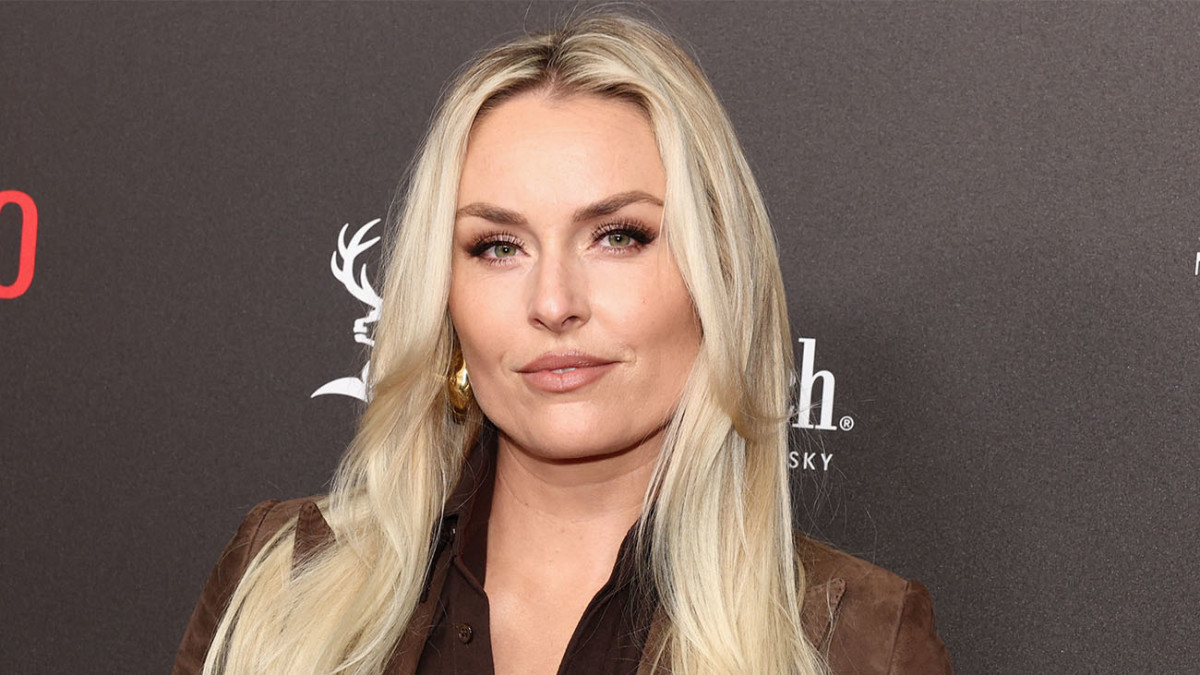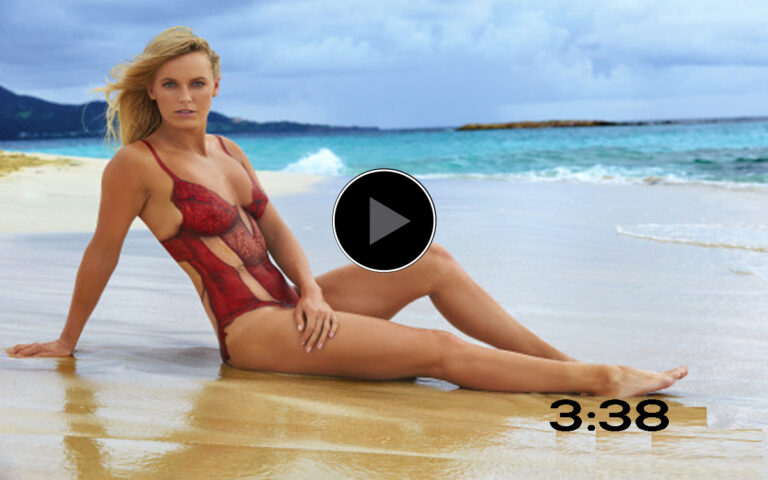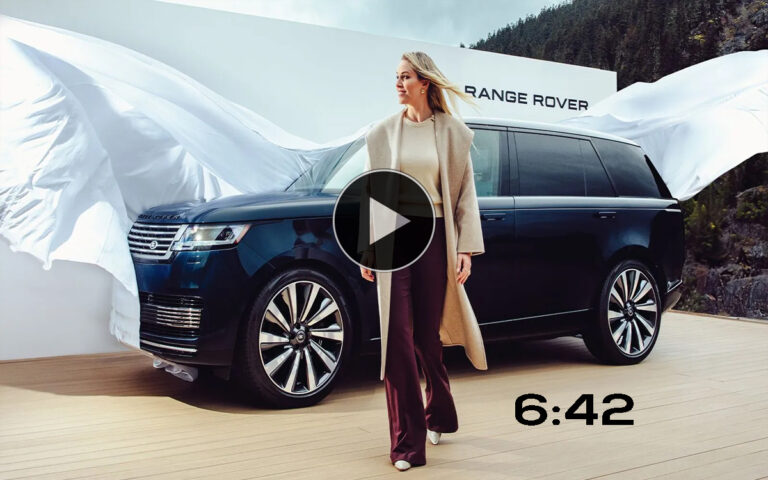I love to push everything to the limit,” Olympic gold medalist Lindsey Vonn told SHARP. As a world-class alpine skier, Vonn’s trophy-filled resume has more than enough evidence to back this up: her accolades include three Olympic medals and a staggering 82 wins at the World Cup. Along the way, Vonn also became the first female athlete to medal at six World Championships. Though she’s now retired from professional competition, Vonn hasn’t slowed down. During a fireside chat at Range Rover House Whistler with Sahar Nooraei, SHARP Editorial & Creative Director, the athlete covered her whirlwind journey from Olympian to entrepreneur.
Early on, Vonn cultivated an intrinsic drive. To succeed, she had to hold herself accountable. “Skiing is an individual sport, so when you’re in the starting gate, no one’s helping you. You’re skiing down the mountain by yourself, and you’re 100% responsible for the outcome,” Vonn said. Complete accountability doesn’t intimidate Vonn in the slightest — in fact, it’s quite the opposite: “I think knowing that win or lose, you hold the power in your own hands, is really empowering.”

Another lesson from alpine racing? Focus. “You have to be 100% present. You can’t be thinking about anything else, whether it’s personal or professional,” Vonn shared. “You can’t be distracted for one second — otherwise, you could literally die.”
Despite the high stakes, Vonn found that skiing was a welcome reprieve from day-to-day stressors — even during the height of her racing career. She called the sport “the one thing that I was able to be 100% present with,” making it an instant passion. “It was obviously the speed and the adrenaline [too], but being present is a hard thing to do these days.”
This feeling — an adrenaline-induced calm — is almost unique to alpine sports. Off the slopes, it’s hard to find the same combination of stimulation and clarity. Perhaps that’s why Vonn has been chasing it since childhood. “I grew up a kid in Minnesota who wanted to be an Olympian,” Vonn remembered. While there’s plenty of children with the same lofty goal, very few can relate to Vonn’s dedication. She attributes much of this to alpine ski racer Picabo Street — the first American woman to win downhill season titles at the 1995 and 1996 World Cups. Vonn looked up to Picabo, inspired by her success in the field.

“Picabo was a disruptor. She did things her own way, very different from everyone else. She did not fit the mold — she was the opposite of the mold, and I respected that. I think that helped me, in turn, be myself and forge my own path,” Vonn explained.
There’s something about being present when you’re driving a car. I like to find those moments where I can be present, and I don’t think about anything else.”
Lindsey Vonn
Forge her own path she did: Vonn’s ambition took her well beyond the slopes. After retiring from alpine racing in 2019, the 39-year-old become a career chameleon. In the mere five years since, Vonn has proven herself as an investor, author, entrepreneur, and even documentarian. Extracurriculars include a stint at Harvard’s “The Business of Entertainment, Media and Sports,” as well as a slew of high profile collaborations and ambassadorships: Range Rover, Rolex, Gucci, and HEAD, to name a few. “Investing was just the next step of my evolution in business,” Vonn said.

On the surface, the corporate world seems at odds with alpine skiing; with its focus groups and risk-assessments, it’s a far more ‘measured’ place. The athlete’s version of entrepreneurship, though, is decidedly different. To keep it exciting, Vonn stays true to herself.
“I value relationships, I value loyalty, I value being honest,” she said. For the athlete, that means partnering with brands that share her passion for adventure. With Range Rover, she’s found that. On a recent trip to South Carolina, for example, Vonn recalled: “We went off-roading, and I just got to max out the car. It was absolutely amazing — kind of how I operate as a human being.”
Exceedingly durable and endlessly adventurous, off-roading in a Range Rover is perhaps the vehicle equivalent of a skier’s flow state. “From a partnership perspective, for me, it’s always been a perfect fit. I never have to question it,” Vonn agreed. “There’s something about being present when you’re driving a car. I like to find those moments where I can be present, and I don’t think about anything else. I’m lucky enough to be partners with Range Rover and be able to have that experience — to be present like I used to when I raced.”
Of course, there’s more to Vonn’s story than fast cars and steep slopes. During her almost two decades spent competitive racing, Vonn sustained multiple career-threatening injuries, one of which forced her to skip the 2014 Olympics in Sochi. Instead of moping, though, Vonn took the setback in stride: “I look at [injuries] from a different perspective, like, ‘what’s the opportunity here? I have a very open mind.” In fact, the time off only encouraged her triumphant return during the 2018 Winter Games in Pyeongchang, South Korea, where she earned a third Olympic medal.
From the outside, it’s easy to mythologize Vonn’s story. At first glance, her career reads like an epic: a hardworking heroine turns setbacks into slingshots, finding global success. Look past the Olympic wins and record-setting races, though, and Vonn’s narrative is profoundly human. Her challenges on the mountain pale in comparison to the hurdles faced in private. Opening up about her mental health, Vonn said her battle with depression began as a lonely one: “There were no tools, there was no guide, there was no one helping me. I was just a teenager trying, to figure out my way in life, and — at the same time — trying to be a professional athlete.”

A culture of stigma makes fertile ground for mental illnesses like depression and anxiety; their insidious nature often prevents people from seeking help. This was certainly the case for Vonn, who remembers feeling insecure about her struggles. “When I was a teenager, if you said, ‘I’m depressed,’ that was a huge sign of weakness. I never told anyone because I was afraid of what people might think of me,” she revealed. Vonn even worried that opening up would compromise her career in sports: “I was teetering on, ‘am I on the US ski team, am I not?’ If I were to say something like that, [I thought] that would hurt my potential of remaining on the US ski team.”
It shouldn’t be so challenging to get help, and for people to even say they need help. It should be second nature to us as human beings.”
Lindsey Vonn
Though Vonn was on the verge of a career breakthrough, she felt more isolated than ever. Mental health was hardly discussed, which meant that tools for dealing with depression were inaccessible. Lacking outside support, Vonn worked through her inner turmoil by turning inward: “I spent a lot of time talking to myself through my journal, and sorting out my emotions, how I dealt with them, and how I could move forward.”
Coping with depression isn’t entirely different from alpine racing: to succeed, Vonn needed to show up for herself. “For me, when I was alone on the road, it was very challenging; luckily enough, I figured out a way and now I’m here,” she added.

Initially, it wasn’t easy for Vonn to open up about her struggles. Then again, qualifying for the Olympics was no cakewalk either. Despite her apprehension, Vonn felt that opening up was the right decision: “I started talking about mental health in 2012 and no one was talking about it — you’re like, ‘is it going to ruin my career if I start talking about depression?’ Ultimately, I decided that it was important for me as a person. I just needed to share it, and that’s part of my journey.”
Vonn’s vulnerability garnered a large public response, sparking a conversation about athletes’ mental health. “So many people came up to me and said ‘I’m so happy you said that. I have depression too,’” she said. Still, a lack of public knowledge meant that others were less understanding: “There were some [people] that were like ‘are you taking medication today?’ And like, it’s not Tylenol — it’s not like you have a headache and you take Tylenol. It doesn’t operate that way.”
The most impactful thing is seeing that I can have a positive impact on other people.”
Lindsey Vonn
Nearly a decade later, the skier stands by her decision to open up. She hopes that her work, along with fellow advocates like Michael Phelps, Naomi Osaka, and Simone Biles, helps erode the stigma around mental illness. “It shouldn’t be so challenging to get help, and for people to even say they need help,” she said. “It should be second nature to us as human beings.”

In 2024, a growing number of athletes are speaking about mental health. Vonn applauded tennis player Rafael Nadal for his perspective: “Nadal was quoted a couple days ago, saying the same thing that I’ve always said: if you’re injured, you have knee pain, you go to a doctor, you do rehab, and you fix it. It’s the same thing with mental health. Like, you don’t feel good, you go to a psychologist [or] a therapist, and you get help.”
“I’m very happy that I shared it and I think it did help a lot of people, especially kids,” Vonn said. “That’s the best thing — not just through mental health, but my whole career — the most impactful thing is seeing that I can have a positive impact on other people. That’s what Picabo did for me, as a 9-year-old. That’s how I approach everything — if someone can have big of an impact in 90 seconds, how can I pay that forward and help other people?”
In 2015, Vonn answered the question. Inspired by her advocacy, Vonn founded the eponymous Lindsey Vonn Foundation to empower young women. “My foundation was one of the biggest silver linings that came out of my injuries,” she said. “I’d missed two seasons in a row, the Sochi Olympics of 2014, and I really sat down with myself said, ‘How can I make this a positive thing?’”

The Foundation takes a multifaceted approach to well-being, offering weekend camps and supporting sports and education through scholarships. Workshops tackle topics like confidence, social media, financial literacy and body image. Vonn calls the latter “a huge issue for kids.” At its heart, the Lindsey Vonn Foundation passes on lessons from Vonn’s own story — namely, how to turn negative setbacks into positive opportunities. “This next year will be our 10th year, and I’m very thankful to be in a position where we can give back. I hope to grow it, expand it, and help as many kids as possible,” she added.
Vonn lives up to the lessons, too. Her retirement wasn’t just the end of a racing career — it was the start of a new lifestyle. When she decided to pursue entrepreneurship, Vonn asked herself: “‘What can I do to be smarter, more educated, be in boardrooms and be comfortable?’”

Talking about her career pivot, she said: “It’s figuring out ways to reinvent myself, not because there’s an expectation, but because I personally want to evolve as a businesswoman and as a woman in general.”
Led by the same drive that conquered the slopes, Lindsey Vonn is constantly breaking new ground — her next move is anyone’s guess. What we do know, though, is that she’ll make it there in record time. As the skier said herself, “That’s just how I am: always on the gas.”
:max_bytes(150000):strip_icc():focal(704x359:706x361)/Lindsey-Vonn-e2dbafb4111e48628fdde0579bc9c6aa.jpg)












